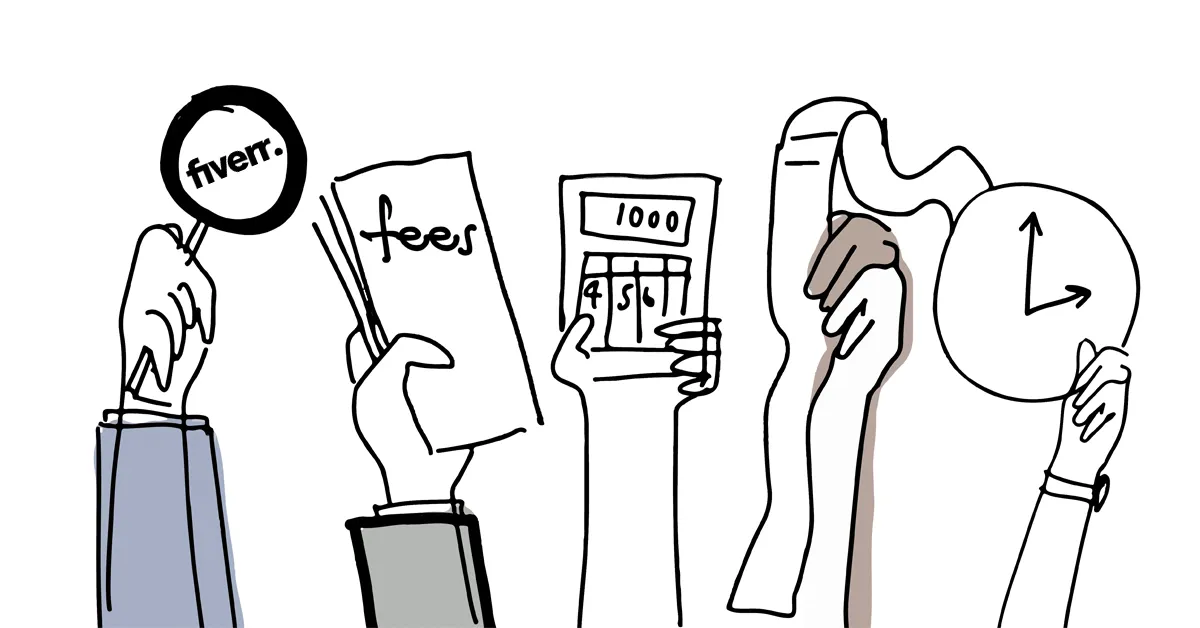When freelancing or running a small business, every penny matters, especially when it comes to expenses and taxes. One question that often arises is whether services from platforms like Fiverr can be considered tax-deductible. This is essential for freelancers and entrepreneurs to understand, as it can impact their overall tax liability significantly. In this piece, we’ll clear up some fog around the concept of tax-deductible expenses, ensuring you’re well-informed as you navigate your financial responsibilities.
Understanding Tax Deductible Expenses

Tax-deductible expenses are essentially costs that can be subtracted from your total taxable income, reducing the amount of income that is subject to taxation. This means that if you spend money on deductible expenses, you might owe less in taxes at the end of the year. Here’s what you need to know:
- Definition: A tax-deductible expense is any cost that is ordinary and necessary for your business or freelancing activities. This could range from equipment purchases to specific services that help you earn your income.
- Ordinary and Necessary: The IRS specifies that an expense must be both ordinary (common in your trade) and necessary (helpful and appropriate) to qualify as deductible. For instance, hiring a graphic designer on Fiverr to create marketing materials could fall under this category if it’s vital for your business.
- Business vs. Personal Expenses: It’s crucial to distinguish between business and personal expenses. If you use Fiverr for personal projects—like designing an invitation for a friend’s wedding—that cost won’t be deductible.
- Document Everything: To take advantage of these deductions, keep thorough records. Save invoices, and organize your expenses to substantiate your claims when tax season rolls around.
In summary, understanding tax-deductible expenses is not just beneficial for your bookkeeping; it can also make a noticeable difference in your financial planning as a freelancer or business owner. So, it’s worthwhile to dive deeper into categories of these expenses and see where Fiverr fits in your financial picture.
Also Read This: Should You Use Your Real Name on Fiverr?
What is Fiverr and How Does It Work?

If you’ve been searching for freelance services, you might have stumbled upon Fiverr. It’s an online marketplace that connects freelancers with clients looking for various services. From graphic design to writing, programming, and marketing, Fiverr offers a plethora of gig options to choose from.
But, how does it work exactly? Here’s a simple breakdown:
- Creating an Account: Both freelancers (known as sellers) and clients (buyers) can easily set up an account for free.
- Finding Services: Buyers can browse through different categories or search for specific services. Each gig features a description, price, and seller’s ratings.
- Placing an Order: Once you find what you’re looking for, you can place an order directly or contact the seller to discuss further details.
- Completion and Delivery: After the seller completes the work, they deliver it via the platform. Buyers can review and provide feedback, helping them decide on future orders.
What makes Fiverr unique is that services start at just $5, hence the name. Although prices can soar up for more complex or high-demand gigs, the platform offers something for everyone. Transparency is a key aspect, as both buyers and sellers can see ratings and reviews, allowing informed decision-making. So whether you’re looking for a quick logo design or engaging social media content, Fiverr lends a hand in virtually every domain!
Also Read This: How to Make Money on Fiverr with No Skills
When Fiverr Expenses Can Be Tax Deductible
Understanding when Fiverr expenses can be tax-deductible is crucial for freelancers and businesses utilizing the platform. Here’s a clarity on various scenarios where these expenses might qualify:
| Situation | Tax Deductible? | Notes |
|---|---|---|
| Purchasing services for your business | Yes | Any service purchased to enhance your business productivity is deductible. |
| Hiring freelancers to perform essential tasks | Yes | Expenses for hiring writers, designers, etc., that contribute to your business operations. |
| Using Fiverr for personal projects | No | Expenses incurred for personal use typically do not qualify for deductions. |
In general, if you’re utilizing Fiverr services that are directly related to your business activities, you can likely claim these costs as deductions come tax season. Always remember to keep your invoices and records organized; maintaining these documents is key to supporting your deductions if needed! Consulting with a tax professional can also help clarify your specific situation, ensuring you maximize your allowable deductions without a hitch.
Also Read This: How to Get Started on Fiverr: A Comprehensive Guide
5. Types of Services Offered on Fiverr
Fiverr is like a treasure trove of freelance services, catering to a wide array of needs and industries. If you're thinking about utilizing Fiverr for your business or personal projects, it’s great to know what kinds of services you can find there. Here’s a rundown of some popular categories:
- Graphic Design: From logos and business cards to social media graphics, talented designers are ready to bring your ideas to life.
- Digital Marketing: Services in this category include SEO optimization, social media management, and content marketing strategies to boost your online presence.
- Writing & Translation: Need a blog post, an eBook, or even translation services? Fiverr hosts a plethora of skilled writers and translators.
- Video & Animation: Whether you need an explainer video or a catchy animation, the creative minds on Fiverr can handle it all.
- Music & Audio: Fiverr offers services like music production, voiceovers, and podcast editing for those looking to polish their audio content.
- Programming & Tech: This is where you can find developers for website creation, app development, and IT support.
- Business Services: This includes consulting, market research, and even virtual assistance to help streamline your business operations.
With such a vast pool of services, Fiverr truly has something for everyone! Whether you’re a small business owner, a content creator, or just someone with a variety of projects in mind, finding the right freelancer is just a few clicks away.
Also Read This: How to Set Up a Credit Card on Fiverr
6. Documenting Your Fiverr Expenses for Tax Purposes
When it comes to tax season, keeping track of your expenses is crucial, especially if you’re using Fiverr for your business. Not only does proper documentation help you stay organized, but it ensures that you can deduct those expenses when filing your taxes. Here are some tips on how to effectively document your Fiverr expenses:
- Keep All Receipts: Always save the digital receipts from Fiverr when you make a purchase. These receipts can be emailed to you and should include the service date, description, and cost.
- Create a Spreadsheet: Maintain a simple spreadsheet where you can log each Fiverr transaction. Include columns for the date, service provided, freelancer’s name, and amount paid.
- Classify Your Expenses: Group your expenses into categories based on the type of service received, like marketing, design, or programming. This will help when it comes time to complete your tax forms.
- Use Accounting Software: Consider using tools like QuickBooks or FreshBooks to automate expense tracking. These platforms often allow you to attach receipts and easily categorize transactions.
- Consult a Tax Professional: If you’re unsure about how to document expenses or claim deductions, it’s always a good idea to get advice from a tax professional. They can provide personalized guidance for your situation.
By following these steps, you’ll ensure that you have a clear, organized record of your Fiverr expenses, making tax time a whole lot easier!
Also Read This: How to Create a Fiverr Seller Account
Common Myths About Fiverr and Taxes
When it comes to using platforms like Fiverr for freelance work or outsourcing tasks, a lot of misconceptions can pop up regarding taxes. Here are some common myths that people often believe:
- Myth 1: Fiverr Income Isn't Taxable - Some individuals think that earnings from Fiverr are "found" money and don't need to be reported. The truth is, all income, including that from freelance jobs, is taxable and must be reported on your tax return.
- Myth 2: Fiverr Fees Are Not Deductible - Many believe that the fees paid to Fiverr for using their services can't be deducted. However, these fees are indeed considered a business expense and can be deducted from your taxable income.
- Myth 3: You Only Pay Taxes on Profits - Some assume you only pay taxes on money earned after expenses. While it’s true that you can deduct expenses, it's essential to understand that all income must still be reported.
- Myth 4: LLCs Don’t Have to Pay Tax on Fiverr Income - Just because you have an LLC doesn't mean you're off the hook! LLCs are typically pass-through entities, meaning profits still get taxed on your personal return.
It’s vital to separate fact from fiction when handling your finances through Fiverr. Understanding these myths can save you from potential headaches down the line!
Also Read This: Discover Gig Title Examples for Digital Marketing Success on Fiverr
Consulting a Tax Professional
When navigating the tax waters of freelancing or using platforms like Fiverr, consulting a tax professional can be invaluable. Here are several reasons why you should consider seeking expert advice:
- Expert Guidance: Tax professionals have the knowledge and experience to help you understand your specific tax situation and obligations.
- Maximize Deductions: A tax expert can help ensure you're not missing out on potential deductions related to your Fiverr expenses, like software, advertising, and even your Fiverr fees.
- Stay Compliant: Tax laws can change frequently. A professional will keep you updated on any changes and ensure that you’re compliant with local, state, and federal tax regulations.
- Peace of Mind: Having a professional handle your taxes gives you peace of mind, allowing you to focus more on your freelance work and less on paperwork.
In conclusion, while using Fiverr can be a great way to boost your income or get help on projects, you should never overlook the importance of managing your taxes correctly. Consulting a tax professional could very well be one of the best investments you make in your freelance career.
Is a Fiverr Tax Deductible Expense?
When it comes to managing your finances as a freelancer or small business owner, understanding what qualifies as a tax-deductible expense is crucial. Fiverr, a popular online marketplace for freelancers offering services across various categories, has become a go-to platform for many seeking help with tasks ranging from graphic design to digital marketing. But the question arises: Is spending on Fiverr services tax-deductible?
Generally speaking, the IRS allows business owners to deduct ordinary and necessary expenses incurred while conducting business. This includes costs associated with purchasing services from platforms like Fiverr. However, there are some conditions and limits you should consider:
- Business Use: To qualify as a deductible expense, the service must be essential to your business operations.
- Documentation: Keeping detailed records is imperative. This includes invoices and payment receipts from Fiverr.
- Expense Type: Fiverr offerings typically fall under professional services, which are generally deductible.
Here is a quick summary of key points regarding the tax deductibility of Fiverr expenses:
| Criteria | Yes/No |
|---|---|
| Is the expense necessary for business operations? | Yes |
| Is there proper documentation? | Yes |
| Is the service related to your primary business activity? | Yes |
In conclusion, expenses incurred on Fiverr can generally be classified as tax-deductible as long as they meet the necessary criteria of being ordinary, necessary for your business, and properly documented. It’s always advisable to consult with a tax professional to ensure compliance with IRS regulations and maximize your deductions.



